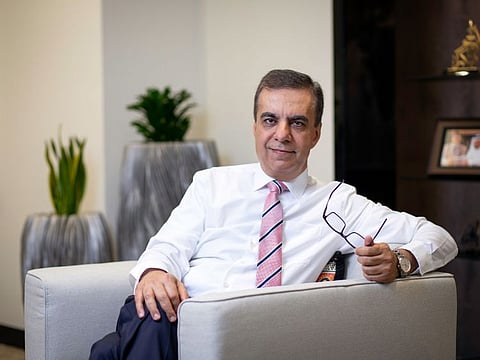UAE and India should have an open-sky policy, says Air Arabia’s Adel Ali
India’s protectionist measures, including air bubble agreements are hurting UAE's airlines

Also In This Package
Dubai: The head of Sharjah’s Air Arabia on Wednesday called for an open-sky policy between UAE and India instead of an air service agreement between the two countries.
“Given that UAE has always been open and liberal, I would love to see an open sky between the two countries – 30 per cent of our population here are of Indian origin and they will benefit from this,” said Adel Ali, CEO of the Sharjah-based low-cost carrier during a CAPA India event.
An open sky air service agreement allows for airlines from the two countries to have an unlimited number of flights as well as seats to each other’s jurisdictions.
Ali said that certain protective measures taken by Indian authorities were slowing Air Arabia’s growth in the Indian market. “As a result of what India has done, our business to a number of other Indian subcontinent (countries) has grown”
Since the beginning of the pandemic last year, India has been operating flights under ‘air bubble’ agreements, giving the country’s airlines an advantage. The ‘India-first’ approach on certain routes ensures that India’s carriers do not face direct competition from operators in the UAE or other countries.
CAPA’s report said that COVID-19 air bubbles had delivered the Indian government’s long-term objective of Indian airlines carrying over half of the international traffic, increasing share to 53 per cent, compared to 43.2 in pre-COVID-19 times.
The relationship between UAE and India has grown “stronger” under the current government, said Ali, adding that the lack of cooperation in the aviation sector was “illogical.”
We feel we could have grown faster in the last 10 years if India was able to provide us more, (our) business has grown satisfactorily and we have adjusted ourselves. Historically, once they (India) commit to a bilateral agreement between two sides, they tend to honor, and deliver - however, what we've seen in the last few years, that has not been the case.Adel Ali, CEO of Air Arabia
Ali further added that regulatory hurdles put up by India were preventing Air Arabia from launching direct flights from Ras Al Khaimah to India.
Big enough
For the last couple of decades, the Indian economy has relied heavily upon the global connectivity that Middle Eastern airlines have provided, which local carriers were unable to offer due to their limited fleets and network reach.
Over the next 20 years, international traffic to and from India is expected to almost quadruple from its pre-pandemic levels, to around 240 million annual passengers. “The market will be large enough to support Indian as well as Middle Eastern carriers, creating opportunities for all,” said Vivek Keerthy, Practice Lead – Strategy, Middle East & North Africa at CAPA Advisory.
Sign up for the Daily Briefing
Get the latest news and updates straight to your inbox









